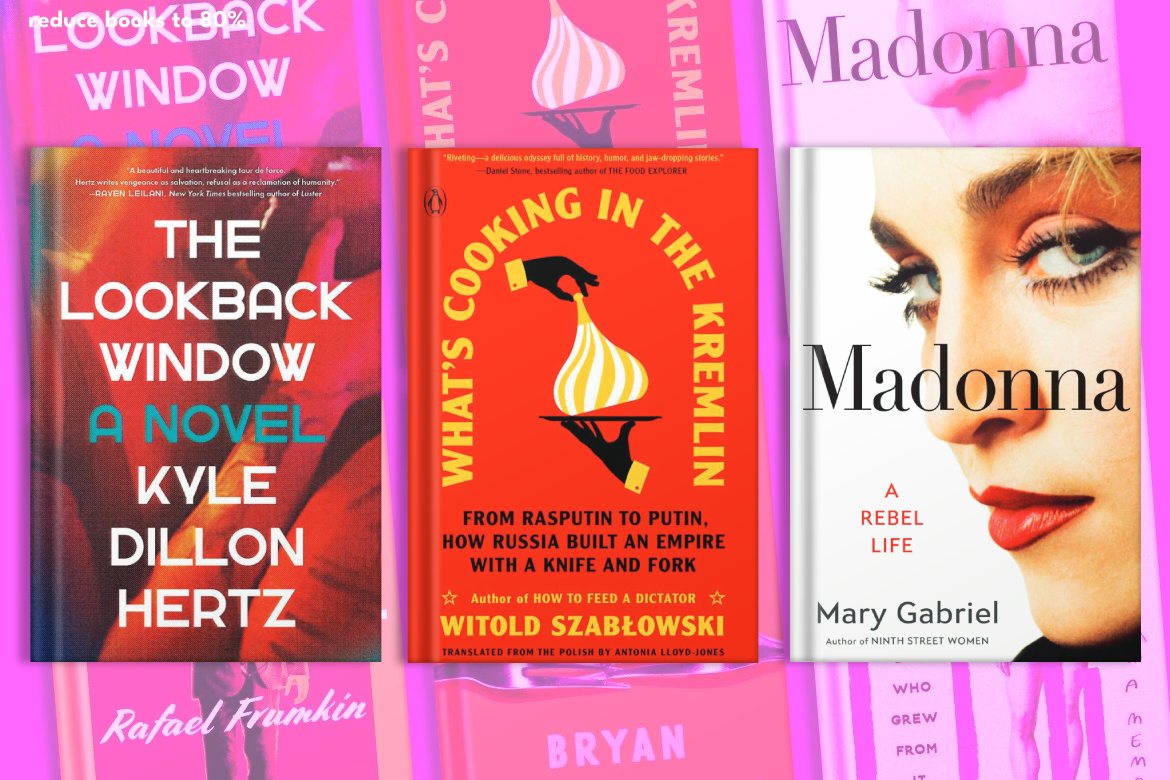Ten diverse books to consider giving this year include: Jamie Loftus’ alternately horrifying and hilarious Raw Dog: The Naked Truth about Hot Dogs; Vulgarian Rhapsody, in which Alvin Orloff alternately spoofs and celebrates starry eyed dreamers; and Rafael Franklin’s scamtastic black comic novel that gives a whole new meaning to “a sucker born every minute”.
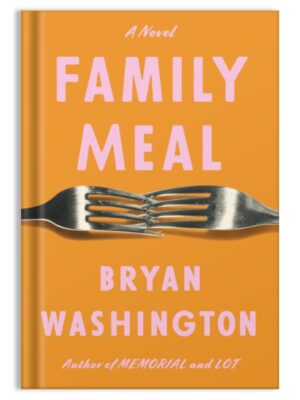
Family Meal by Bryan Washington
In the unusual introduction to his delicately nuanced, big-hearted second novel, Family Meal (Riverhead. $28. brywashing.com), Bryan Washington offers a message we’d all do well to heed this holiday season: “Care and slowness are two gifts that we deserve, boundless pools we can offer ourselves and those we hold dear.” He also reminds the reader that “there’s no wrong way to be, and the only right way is the way that you are.” The story he goes on to share with us is yet a third gift that reflects and magnifies the pair he’s already recommended: In the wake of his Los Angeles’ boyfriend’s sudden death, Cam returns to his hometown, Houston. He finds himself drawn back into the loving embrace of his old friend T.J.’s family, which took him in as a teenager after his parents were killed in an auto accident. As his new grief is compounded by memories of his earlier loss, he also wrestles with the awkward memories of his adolescent sexual experimentation with T.J., which had felt simultaneously like romance and incest. Major secondary characters bring their own perspectives on love, loss and family into the mix, including Noel, a non-binary co-worker of T.J.’s who Washington depicts with ingenious sensitivity. While painstakingly honest in its depiction of addiction, grief, and loneliness, “Family Meal” is ultimately optimistic and deeply satisfying; sustenance in book form.
BUY BOOK When you purchase a book from our curated Bookshop.org shop we earn an affiliate commission. The books are independently reviewed by our book editor and the potential commission does not influence the review in any way.
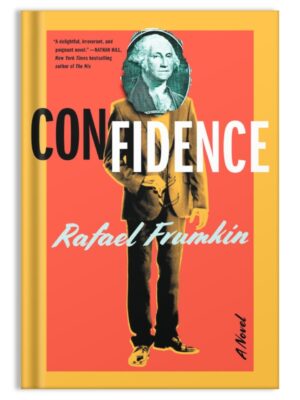
Confidence By Rafael Frumkin
Should any of your friends or family members’ holiday wish lists include items from Amway, Goop or Tony Robbins, rebuff their foolish inclinations and gift them a copy of Rafael Frumkin’s scam-tastic black comic novel Confidence (Simon & Schuster. $27.99. rfrumkin.com). This story of loose morals, flirtation, and flim-flam begins when teenagers Ezra Green and Orson Ortman first meet in reform school. Homely queer Ezra is smitten with his dreamy blond fellow detainee. Orson’s not above a screw or two to insure his brainiac buddy’s lifelong loyalty (This book gives a whole new spin to “a sucker born every minute”). Upon their release, the duplicitous duo engages in an escalating series of schemes that culminates in NuLife, a magnetic brain-stimulating gizmo alleged to elevate mood, spur personal success, and generally improve the life of any rube willing to pay for it. NuLife becomes the centerpiece of a Scientology-like sect in which Orson serves as “L. Ron Hotboy,” cultivating his public image while Ezra pines behind the scenes. With echoes of the NXIVVM cult, the Lula Roe leggings fandango, and a hundred other made-for docudrama self-improvement scandals, Confidence will pull you in and keep you grinning until your sense of outrage kicks in.
BUY BOOK When you purchase a book from our curated Bookshop.org shop we earn an affiliate commission. The books are independently reviewed by our book editor and the potential commission does not influence the review in any way.
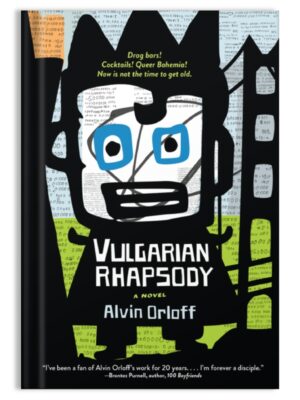
Vulgarian Rhapsody by Alvin Orloff
In Vulgarian Rhapsody (Three Rooms Press. $16. alvinorloff.com), San Francisco writer Alvin Orloff (Gutterboys, I Married an Earthling, Disasterama) simultaneously spoofs and celebrates the starry eyed dreamers, would-be artistes, and motivationless loafers who persist in believing that the city by the bay will always and forever be a judgement-free wonderland out of the hippie ‘60s. Oopsy! That’s not quite the case in 1999 when the first dotcom boom sweeps the city and obnoxious gay bon vivant Harris McNulty finds himself unable to keep up with rising rents on his telemarketer’s salary. He becomes a hapless human pinball, ricocheting his way through an increasingly downtrodden community of drag queens, sex workers, musicians, and pranksters. This fictional picaresque is packed with authentic details drawn from the author’s five kaleidoscopic decades in the city. Want more juicy stories? Orloff will be happy to chat if you drop by Fabulosa, the bookstore he now runs on Castro Street.
BUY BOOK When you purchase a book from our curated Bookshop.org shop we earn an affiliate commission. The books are independently reviewed by our book editor and the potential commission does not influence the review in any way.
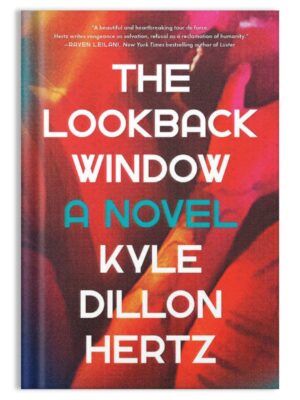
The Lookback Window, A Novel by Kyle Dillon Hertz
For nearly a decade now, Hanya Yanagihara’s pitch dark A Little Life has reigned as the dark prince of contemporary gay novels, strangely irresistible despite the excruciating details of its deep dive into sexual and psychological depravity. Well, for readers who relish a dark counterpart to the forced cheer of holiday season, new blood has finally arrived on the trauma tome throne: Debut author Kyle Dylan Hertz’s The Lookback Window (Simon & Schuster. $26.99.
kyledillonhertz.com). It’s the harrowing tale of Dylan (a moniker uncomfortably close to the author’s middle name), who as a young teen was abducted, raped, and drugged by a neighbor who then trafficked him to other men through a shadowy secret network. The scars of his past have already set Dylan, 26, on a dangerously unstable track when the state of New York introduces the novel’s titular judicial program, a real world policy that temporarily lifts the statute of limitations on sexual abuse, allowing past victims to press charges. Despite its good intent, the window reopens a world of pain for Dylan, sending him into a nightmarish descent full of gruesome memories, revenge fantasies, and self-destructive behavior. Readers who gravitate to Dennis Cooper, Jean Genet, and Gary Indiana will not only appreciate the unflinching gleam of Hertz’s prose, but also note his sophisticated take on the ambiguous boundaries of crime and punishment.
BUY BOOK When you purchase a book from our curated Bookshop.org shop we earn an affiliate commission. The books are independently reviewed by our book editor and the potential commission does not influence the review in any way.
TRUE STORIES

Touching The Art by Mattilda Bernstein Sycamore
A provocative, poetic examiner of what it means to be queer in contemporary American culture, the prolific Mattilda Bernstein Sycamore has already given us a shelf full of gems, including Sketchtasy, a dark memoir of 1990s Boston; The Freezer Door, a surreal rumination on gentrification; and, as editor, Between Certain Death and a Possible Future, a collection of essays by queer writers who came of age amidst the AIDS crisis. But all of Sycamore’s prior work now feels like a pathway toward her markedly mature latest: Touching the Art (Soft Skull Press. $27. mattildabernsteinsycamore.com) a singular mix of personal history, moral inquiry, and aesthetic revel. The throughline is Sycamore’s relationship with her late paternal grandmother Gladys. From childhood, Sycamore, who was raised a boy, felt a stronger connection to Gladys than any of his other relatives. Iconoclastic Gladys served as a role model for her granddaughter, an avant-garde visual artist at a time when women remained marginalized in the museum and gallery worlds; a prideful woman who nonetheless sacrificed many of her aspirations and deep-seated beliefs in efforts to conform to late 20th century norms. Despite its strength, that early grandparent-grandchild bond seemed irreparably shattered after Sycamore came out as queer and later revealed that she was molested by her father (Gladys’ son). In Touching the Art, Sycamore sets herself on an emotional odyssey, venturing into her grandmother’s old haunts and her own haunted psyche. While Sycamore’s prose and her judgments have occasionally felt brittle in past works, she writes with a generous tenderness here.
BUY BOOK When you purchase a book from our curated Bookshop.org shop we earn an affiliate commission. The books are independently reviewed by our book editor and the potential commission does not influence the review in any way.
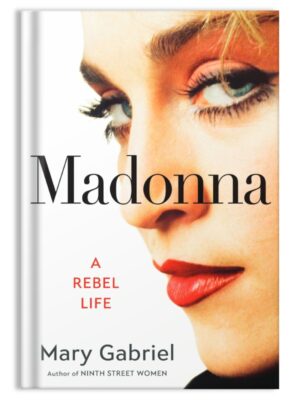
Madonna A Rebel Life by Mary Gabriel
Mariah Carey may claim to be Queen of Christmas, but the evergreen diva under this year’s tree is unquestionably Madge. At 880 pages and nearly three pounds, biographer Mary Gabriel’s Madonna: A Rebel Life (Little Brown & Co. $38. bit.ly/MaryGabriel) hits the present pile with a triumphant thump. Gabriel, a Pulitzer finalist for her work on Jenny von Westphalen, the wife of Karl Marx, is no gossip monger. She decided to take on Madonna following publication of her her 2018 book Ninth Street Women, about Lee Krasner, Elaine de Kooning, and other female abstract expressionist painters whose contributions to modern art have long been obscured by their male counterparts. Madonna, born in 1958, the year before Ninth Street Women concludes, struck Gabriel as a worthy next subject as she continued her exploration of female leaders in contemporary arts and culture. Throughout this thorough, thoughtful volume, Gabriel makes it clear that Madonna served as the architect of her own success, never bending to the will of male music business honchos who had previously maintained strong control over the careers (and images) of woman musicians. She also emphasizes Madonna’s steadfast support not only for queer rights, but for shame-free queer visibility. Until the Celebration tour comes your way in 2024, there’s plenty of material (girl) to get immersed in here.
BUY BOOK When you purchase a book from our curated Bookshop.org shop we earn an affiliate commission. The books are independently reviewed by our book editor and the potential commission does not influence the review in any way.
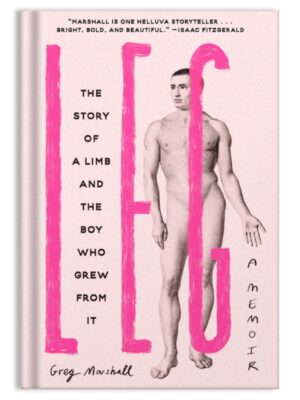
Leg: The Story of a Limb and the Boy that Grew from It by Greg Marshall
Queer writer Greg Marshall was born with cerebral palsy. And while that’s certainly not funny, there’s very little else that isn’t in his no-punches-pulled (but many a punchline delivered) family memoir, Leg: The Story of a Limb and the Boy that Grew from It (Abrams. $28. gregrmarshall.com). While he was diagnosed with CP as an infant, Marshall’s parents, non-Mormons raising a family in Utah, decided not to explain the situation to their son, because, as his mother later explained it: “I don’t believe in labels.” Marshall grew up understanding only that he had “tight tendons” even as he walked with a limp and suffered through painful leg surgeries. Only when applying for medical insurance as a graduate student did he learn the truth. As ass backward as some may find it, Marshall’s mother’s philosophy served him well: Marshall hasn’t let limitations and social stigma hold him back as a differently abled person, a teenager coming to terms with homosexuality, or the boyfriend of a man with AIDS. Telling his life’s stories with irreverent humor rather than self pity comes naturally to Marshall and sets an example for the rest of us. He’s a regular Tiny Tim, god bless him.
BUY BOOK When you purchase a book from our curated Bookshop.org shop we earn an affiliate commission. The books are independently reviewed by our book editor and the potential commission does not influence the review in any way.
HOLIDAY COOKERY
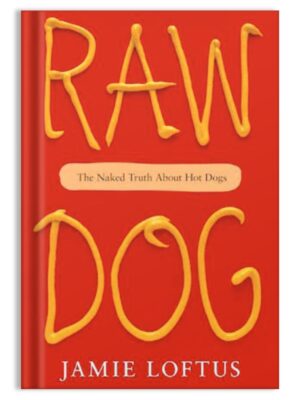
Raw Dog by Jaimie Loftus
It wouldn’t be Christmas without some food snob groaning with disgust at the fruitcake. This year, you can respond with an “I’ll give you something to groan about…” in hardback form: Jamie Loftus’ alternately horrifying and hilarious Raw Dog: The Naked Truth about Hot Dogs (Forge Books. $26.99. jamieloftus.xyz). Loftus, creator of the bitingly comic podcast series “My Year in Mensa,” turns her thoughts from high IQs to lowest common denominator dining in this account of, quite literally, how the sausage is made, eaten, and celebrated. In this juicy, snappy hybrid of Upton Sinclair’s factory farming exposé The Jungle and Calvin Trillin’s lovingly droll culinary commentary, Loftus wanders through wiener world, exploring everything from pink slime to Gray’s Papaya; from New York’s Nathan’s Famous striped with spicy mustard, to Chicago Vienna Beef dogs topped with sport peppers and celery salt, to that bubbling frank and bean casseroles your Aunt Vivian made for church potlucks. Would you like eggnog with that?
BUY BOOK When you purchase a book from our curated Bookshop.org shop we earn an affiliate commission. The books are independently reviewed by our book editor and the potential commission does not influence the review in any way.
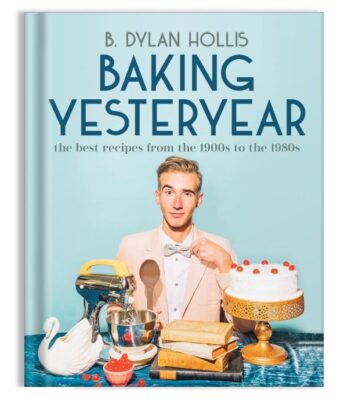
Baking Yesteryear by B. Dylan Hollis
Dressed in dapper vintage fashion and folding the queer equivalent of dad jokes into his patter, 27-year old Bermudaborn, Wyoming-based B. Dylan Hollis is a sweets sensation. After rising to the highest ranks of both TikTok and twinkdom by cooking up cakes, cookies, and Jell-O based whatchamacallits in charming video clips, he’s parlayed his notoriety into an irresistibly giftable cookbook, Baking Yesteryear: The Best Recipes from the 1900s to the 1980s (Dorling Kindersley. $32. tiktok.com/@bdylanhollis). Hollis, an accomplished jazz pianist, started collecting old school community cookbooks during the pandemic and quickly shot to fame preparing and assessing the intriguing dessert recipes he discovered. He’s refined and collected his favorites here, drawing on alumni fundraising volumes, ladies’ auxiliary club publications, and similar folksy tomes to showcase pantry-raiding recipes for the likes of Tomato Soup Cake, Potato Chip Cookies, and Velveeta Fudge.
BUY BOOK When you purchase a book from our curated Bookshop.org shop we earn an affiliate commission. The books are independently reviewed by our book editor and the potential commission does not influence the review in any way.
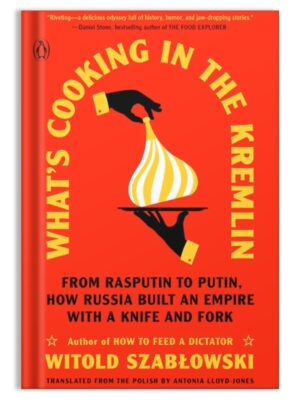
Whats Cooking In the Kremlin by Witold Szablowski
Globetrotting gourmets and international men of mystery alike will find much to intrigue them in Witold Szablowski’s culinary travelogue What’s Cooking in the Kremlin: From Rasputin to Putin, How Russia Built an Empire with a Knife and Fork (Penguin. $20. penguinrandomhouse.com). Looking at Russia’s social history through a kitchen prism, Polish-born journalist Szablowski travels from Stalin-era Georgia to the battlefronts of Afghanistan, to the wastelands around Chernobyl and to Mariupol, Ukraine just before the recent invasion. Exploring the Kremlin’s longtime focus on food as a symbol of global prestige, he shares tales of Putin’s grandfather, a cook in sanitariums who has been reinvented through propaganda as Stalin’s personal chef. Chronicling past famines, he has survivors describe pinecone soup and tree bark bread. He interviews the cook who developed recipes to feed cosmonauts and the Moscow caterer who prepared state dinners for Richard Nixon. And employing the dark humor that characterizes his prose throughout, Szablowski fantasizes about the end of Russia’s current regime: “For many years it has not been the people in the streets who have overthrown Russia’s dictators but palace coteries…Perhaps there’s already a cook at the Kremlin who’s going to add a few drops of poison to Putin’s soup, whether it’s borscht, shchi, or ukha. I hope one day I’ll have the chance to ask them what kind of soup it was.”
BUY BOOK When you purchase a book from our curated Bookshop.org shop we earn an affiliate commission. The books are independently reviewed by our book editor and the potential commission does not influence the review in any way.


